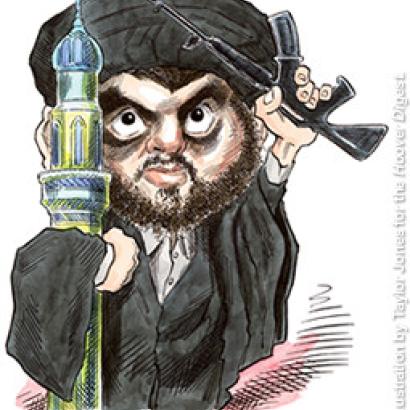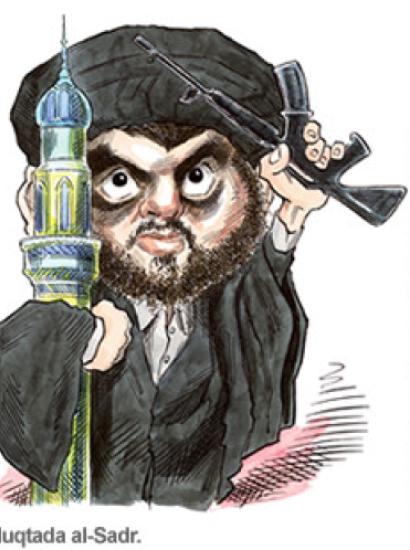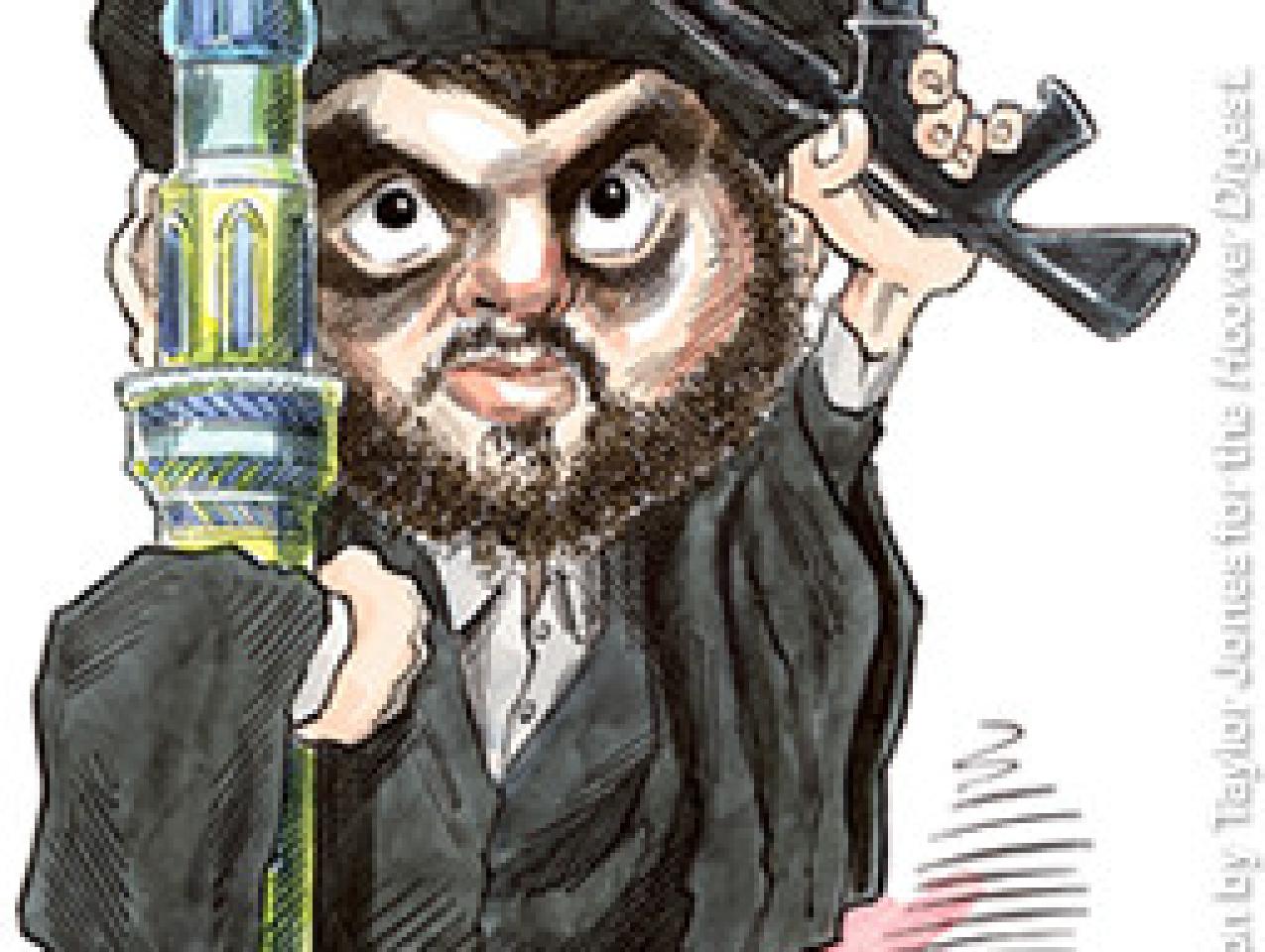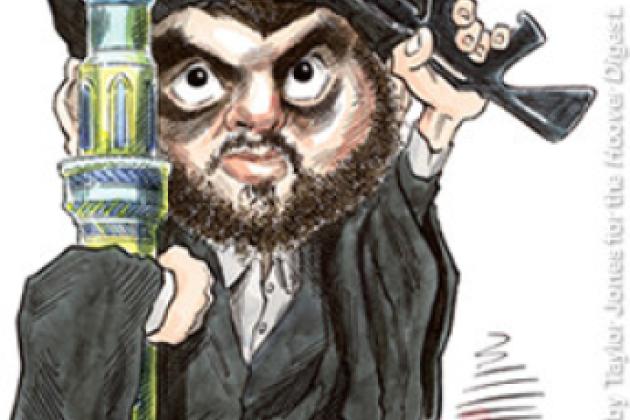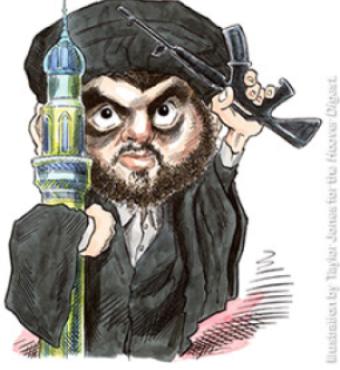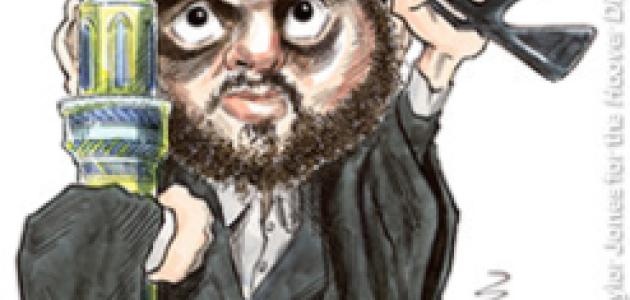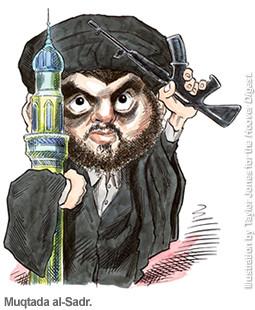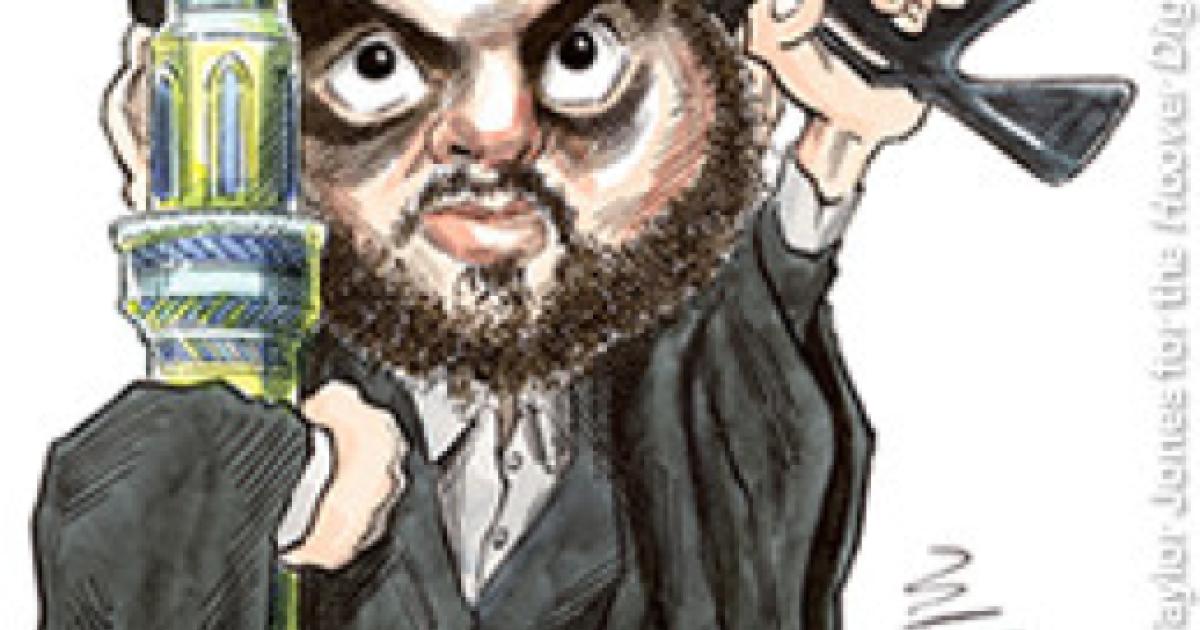- Security & Defense
- US Defense
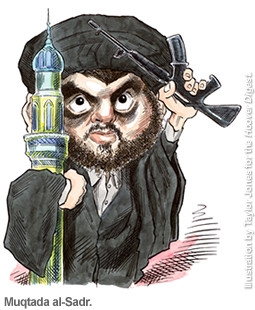
HILLA, IRAQ—On a rough, woven mat, under a huge tented mudheef (a traditional reed-frame guesthouse), atop the roof of one of Iraq’s most beautiful mosques, a giant bear of a man implores his American visitors to act against the religious fanatics who have vowed to kill him and destroy his movement for democracy. The black-turbaned man with outsized feet, hands, girth, and ambition is a Sayyid, a direct descendant of the Prophet Mohammed. With his unruly black beard, flowing clerical garb, and retinue of religious followers, he could easily be mistaken for just another radical Shiite mullah.
But this is a different kind of Islamist cleric. In the former presidential mosque in Hilla—a majestic, towering new structure of stone and marble that Saddam never allowed the impoverished Shiite masses of this ancient Babylonian region to pray in—Sayyid Farqad al-Qizwini has established a university for humanistic studies. His students—men and women—study not just Islam but all of the world’s great religions (including Judaism and Christianity) and principles of democracy as well. On the grounds behind the mosque, millions of dollars in U.S. assistance have gone to construct a regional democracy center (already completed), men’s and women’s dormitories, and a cafeteria. This complex will enable Iraqis throughout the region to receive intensive training in the ideas, values, and techniques of democracy. Twice I have made my own contribution to its efforts at training and dialogue: in late January (when I addressed some 800 Iraqis in the mosque itself) and on March 31, when I lectured to 200 Iraqis and engaged the irrepressible Sayyid inside his mudheef.
The South Central Regional Democracy Training Center is a gleaming new building, with a conference room, two state-of-the-art computer rooms with 36 computers, more than a dozen offices, and a 200-seat auditorium. It is designed to house, assist, and empower a plethora of nongovernmental organizations and democracy activists from all over Iraq. And through the miracle of MSN’s “Arabic Messenger,” it will be connected over the Internet to 18 local democracy centers (for human rights, women, and development) in Najaf, Karbala, and the four other provinces of South Central Iraq. In the mosque, Qizwini has established the largest single center in Iraq for translating Western works on democracy into Arabic, with 30 computer terminals and numerous professional translators at work every day, and also a new radio station that will broadcast far and wide the lessons and issues of democracy.
The Coalition Provisional Authority (CPA) has been generous to Qizwini and his vast movement, which tribes as far away as Kuwait and Saudi Arabia are bidding to join. But we have not given these brave and creative Iraqis the one thing they now implore us to provide: the rule of law.
From the roof of the democracy center in Hilla, one can almost see a few minutes down the road a very different center of activity. In the courtyard of a nondescript building, the followers of a crude, young, radical, anti-American Islamist cleric, Muqtada al-Sadr, are training for the new war in Iraq. They are learning how to handle firearms, assemble bombs, and kill “infidels.” Like Qizwini, Sadr has a fiery black beard and an ability to organize and move the masses. And his father, like Qizwini’s, was murdered by Saddam’s regime during the 1990s. But there the resemblance ends. Saddam meant to kill Sadr’s father, who had a wide following. The car bomb that killed Qizwini’s father was meant for Qizwini himself, a leader in the underground resistance.
Qizwini’s vision is expressed in these words that moved him at the Jefferson Memorial when he visited Washington in March: “I swear eternal enmity, upon God’s altar, to all forms of tyranny.” Sadr’s vision is of a new tyranny, an Iranian-style Islamist dictatorship in which he will have the ultimate power. Whereas Qizwini has been building a massive peaceful movement of farmers, tribal sheikhs, moderate Islamic clerics, women’s rights advocates, and urban professionals—the Iraqi Democratic Gathering—Sadr has been using massive inflows of Iranian money and arms to take by force the power that he can never win at the ballot box. On my visit to Hilla, a CPA colleague who has spearheaded the construction of the vast new civic infrastructure to support Iraqi democracy confesses that if we do not act forcefully against Sadr soon, this multimillion-dollar, high-tech democracy complex could soon become “The Muqtada al-Sadr Center for the Making of Islamist Revolution.”
In the days before my March 31 visit, Sadr’s organization had been widely distributing a leaflet denouncing Qizwini and 10 of his leading supporters as “pigs and dogs” who had defiled Islam and needed to be “stopped and silenced.” Qizwini had been living under threat of assassination for months, but this public declaration of justification for his murder raised the stakes. The menace of radical, Iranian-backed armed militias—not only Sadr’s Mahdi Army but the Badr Brigade of the Supreme Council for the Islamic Revolution in Iraq (SCIRI), long based in Iran until Saddam’s overthrow, the militia of the Islamist Da’wa Party, the Hizbollah, and many other smaller groups and factions—was mounting rapidly through the early months of this year, even as the leaders of their sponsoring political parties were sitting in Baghdad on the Iraqi Governing Council, signing democratic declarations and evincing to their American interlocutors sweet moderation and restraint.
As we sat under the mudheef on March 31, chatting with regional CPA officials, Qizwini pressed the United States to act immediately. “These militias will turn Iraq into a dark age of bloodletting if they are not stopped soon. Any decision to dissolve the militias should be implemented in the next week.” At that moment, I thought Qizwini’s statement a bit hyperbolic in its urgency. For several weeks, I had been coming to a similar conclusion about the danger of the militias and the need for the CPA to act energetically, comprehensively, and soon. But I did not realize that the dam was about to burst. That very day, four American contractors would be brutally murdered in Fallujah, their bodies hung like hunting trophies from a bridge. Three days later, U.S. forces would arrest Sadr’s top deputy, Mustafa al-Yaccoubi, and Sadr would launch an all-out rebellion against the occupation, seizing control of Najaf, Kufa, and many other strategic sites.
Sadr’s uprising could have been prevented if we had listened to Qizwini, to many other moderate Iraqis, and to many of our own civilian officials in the CPA who had been appealing for months for decisive action. Since at least August 2003, there had been sealed warrants for the arrest of Sadr, Yaccoubi, and 10 others for the murder last April of the moderate Shiite cleric Ayatollah Abdel-Majdid al-Khoei. In October, CPA forces intercepted dozens of busloads of heavily armed Sadr followers, numbering in the thousands, as they were headed to Karbala to seize control of its holy shrines and the central city. In the months before the dam burst in April, the Mahdi Army and Sadr’s associated ragtag followers had been growing alarmingly in size, muscle, and daring. They had seized public buildings, beaten up university professors and deans, taken over classrooms and departments, forced women to wear the hijab, set up illegal sharia courts, imposed their own brutal penalties, and generally made themselves a law unto themselves. On March 12, they wiped a Gypsy village of about 1,000 people, Qawliyya, off the face of the earth, declaring it to be a den of prostitution and immorality (most of the residents fled in advance in terror). All this violence and thuggery is meant to intimidate and cow opponents, to create the sense of an unstoppable force, and to strike absolute fear into the hearts of people who could be so naive as to think they could shape public policy and power relations by peaceful, democratic means.
If a transition to any kind of decent, lawful political order were feasible, Sadr’s organization had to be put out of business. Coalition figures knew this. Repeatedly, plans were prepared to take down Sadr, but, for one reason or another, they were never executed. Some of these reasons, it appears, involved political calculations in Washington that the risks were too great. The risks of allowing Sadr to continue to terrorize Iraqi democrats were never adequately weighed.
Finally, in May, U.S. forces moved to dislodge Sadr’s ragtag fighters from the buildings, neighborhoods, and cities they had seized. But the effort comes now at a much greater cost, and with the recent devastating combination of blows to U.S. credibility—from the failure to provide security, to the horrific photographic evidence of American mistreatment of Iraqi prisoners—the kind of order that could have been secured a few months ago will not be achieved any time soon.
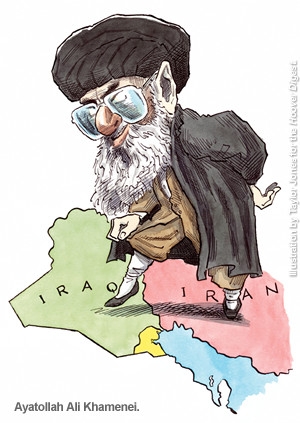
Iran’s Winning Game Plan
Even with the defeat of Sadr’s Mahdi Army, we still face the vexing problem of the other Iranian-backed, Islamic fundamentalist militias. There is no way that we will face down all these militias militarily with anything like the force we now have on the ground. Since January, the CPA has been negotiating a comprehensive “disarmament, demobilization, and reintegration” (DDR) plan with the principal militias in the country. Like all classic DDR efforts in post-conflict situations, it relies on a generous mix of incentives to move militia fighters into the new police or army or find them a civilian job or retire them with a decent pension. The plan, which was to have been announced around May 1, always required forcible action to demobilize the “spoilers”—those forces that were bent on winning by violent action and would never negotiate—particularly the Mahdi Army.
With the CPA’s loss of control of key parts of Iraq at the end of March, the CPA also lost bargaining leverage with other militias, and the negotiation of the DDR plan was badly handicapped. In particular, SCIRI and Da’wa, sponsors of the other two most important Iranian-backed militias, found themselves in a much more powerful negotiating position. It is important that the militias outside the Kurdistan region (a special case, given its history of oppression by the central government) be integrated into the new Iraqi police and armed forces only as individuals, not as coherent units. But the DDR plan that was finally announced in early June, while comprehensive in its structure and scope, lacks convincing enforcement mechanisms, as it came into effect when the CPA was nearing the end of its existence and the United States could not afford to confront any more militias militarily.
The Islamic Republic of Iran is the one player in Iraq whose strategy—to back a number of radical, Islamist forces in an effort to thwart a transition to democracy and secure a permanent foothold in the country—has so far been working brilliantly. Under many different scenarios, the mullahs in Iran could succeed in Iraq. If elections take place under the shadow of heavily armed militias, pro-Iranian Islamists will emerge as the dominant force in Iraq, even if Sadr and his Mahdi Army do not recover from the military defeats they have suffered. If elections do not occur by the promised deadline of January 31, there could be an anti-American reaction, anti-U.N. reaction, and Iran could gain. If America withdraws most of its forces from Iraq before coherent and capable armed forces of a decently structured Iraqi state are ready to assume the burden, there will be civil war, and pro-Iranian militias of one stripe or another will seize control of key parts of the south. Under any of these scenarios, Iran wins and America loses in Iraq.
By contrast, there is only one scenario for American “success” in Iraq—limited, bloodied, and tarnished though it would be. That is to defeat and dismantle the Mahdi Army, and then go on to support the creation of a truly new and independent Iraqi army and police force. These could be drawn in significant measure from cooperative tribes and from the veterans of the 1991 Shiite uprising against Saddam, who have affiliated themselves with the Iraqi Democratic Gathering.
We are well beyond the point where we can achieve a comprehensive military victory in Iraq. But the defeat of the Mahdi Army, in combination with a vigorous strategy for demobilizing other militias and building up the forces of a new Iraqi state, can yet lead to a turning point in the new war for Iraq.








